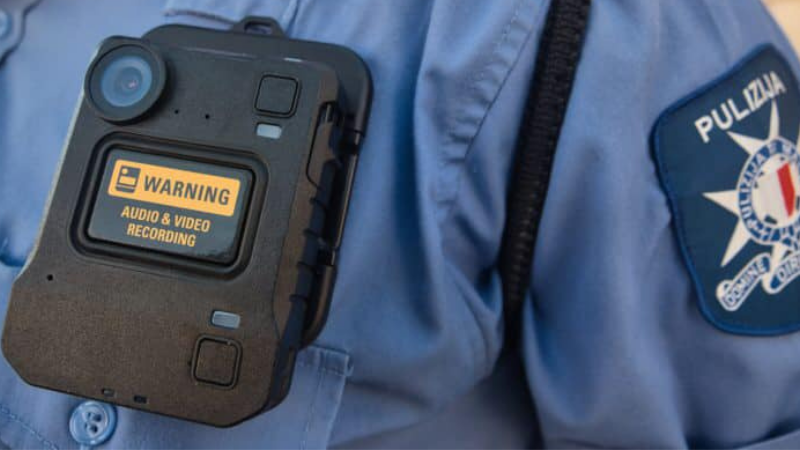Five months after the government announced that police officers in Malta would begin using bodycams when interacting with the general public, former European Court of Human Rights Judge Giovanni Bonelli told The Shift News, “there is no doubt that the use of body cameras by the police can, under certain circumstances, interfere in the individual’s right to privacy.”
Bonello, who is now retired after spending 12 years on the ECHR bench, pointed out that while the state is authorised to limit enjoyment of the fundamental human right to privacy, it must do so “under very strict conditions”.
Bonello was answering questions sent by this newsroom about whether a system which insists that officers switch on their bodycams during virtually all interactions on-duty may constitute breaches of privacy.
“One of the very functions of the police force is to protect national security and to prevent disorder or crime, in the superior interests of the community,” Bonello said.
“So, measures by the police that breach privacy are justified, provided the police can show that they were strictly necessary to protect national security or to prevent disorder or crime. The pursuit of these aims must be genuine and be limited to the very minimum required,” he added.
Bonello also assessed the police force’s decision to regulate the use of bodycams using a Standing Order instituted by police commissioner Angelo Gafa’ rather than a legislative amendment to the Police Act.
“One other condition to justify an interference by the state in the right to privacy of the individual is that the interference must be expressly authorized by a law. In this case, ‘law’ means an enactment by an authority of the state having legislative powers, that is public, unequivocal, and accessible,” Bonello said.
“The pre-existence of such a law in one of the indispensable prerequisites to make any interference in privacy legitimate,” he added. According to the Police Act, the police commissioner can institute Standing Orders which, legally speaking, acts as an internal code of conduct set for officers.
According to information provided by the Malta police force, “there was no need for amendments” for the use of bodycams since the commissioner has the legal authority to issue such a Standing Order.
While the Standing Order does state that failure to activate the bodycam or otherwise request to save the footage or generally abuse of the system “may result in disciplinary action”, it remains unclear what specific punishment would be reserved for such an offense.
The bodycams being rolled out across police stations in Malta and Gozo begin recording automatically, because officers receive their assigned cameras in a setting known as “buffering mode”.
“In this mode, the camera is constantly recording two-minute volatile buffer clips which are instantly deleted by the hardware itself unless the officer switches the camera to ‘event mode’,” a spokesperson for the police said.
The body-worn camera (often referred to as BWC) only ‘saves’ footage when the officer switches the camera to ‘event mode’, a setting which is also triggered automatically whenever an officer pulls out their gun or taser.
“All footage is manned by a limited number of police officers within the In-Field Tech Department of the Malta Police Force,” the spokesperson added, pointing out that all videos are encrypted both when held in the camera’s memory bank as well as when they’re uploaded onto Amazon Cloud servers in Milan, which is where the local police force is storing its data.
According to the spokesperson, Amazon’s servers provide “full tamper-proof audit records that are created in real-time and available for full monitoring”. However, it remains unclear who supervises the officers in the In-Field Tech Department and whether there are any regulatory mechanisms for their behaviour.
Do BWCs work?
Eight researchers from North America and Australia carried out a systemic review of 30 research papers which attempted to investigate the effectiveness of BWCs as they were deployed en masse across the US, an increase in use which can be roughly traced to increased public awareness of police brutality and the rise of the Black Lives Matter movement.
BWCs were widely deployed in the belief that they would improve police accountability, serve as evidence for disputed versions of events, help reduce complaints against officers and improve relations between the police corps and the general public.
However, the systemic review carried out through a collaboration between George Mason University, the University of Queensland and the Queensland University of Technology suggests that BWCs “did not have statistically significant or consistent effects on most measures of officer and citizen behaviour”.
“BWCs will not be an easy panacea for improving police performance, accountability, and relationships with citizens. To maximize the positive impacts of BWCs, police and researchers will need to give more attention to the ways and contexts (organizational and community) in which BWCs are most beneficial or harmful,” the review’s conclusions state.
The research also refers to how police officers should not have exclusive access to the footage and that the public and interested parties such as the media should have the right to access unaltered footage.













